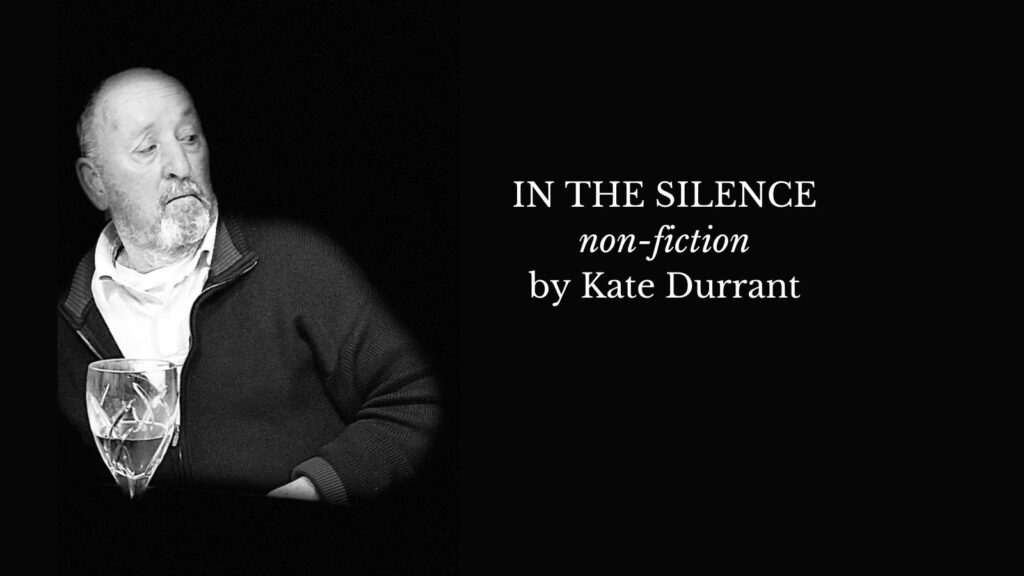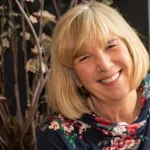

In the Silence
by Kate Durrant
’Does he know what day it is?’ they ask, head on one side, lips forming a sympathetic purse.
Tutting at the thought of Friday becoming Wednesday, or the horror of a never ending week of Mondays. Clinging to the layperson’s diagnostic dementia tool of knowing what day of the week it is.
As if it matters what we call these long days of doing nothing. Slowly.
But as it happens, he does know.
Except, of course, on those days when he doesn’t.
On Sundays we dress and visit a local hotel for lunch, sitting together in seats that have taken our weight for years, a different weight to the one we carry now.
People pass.
Some smile.
Others pretend not to see us.
A neighbour waves casually as she slides by, phone pressed to her ear.
One lady pauses.
’How is he?’ she asks with the encouragement of a raised brow and a head thrown vaguely in his direction.
‘Him?’ Him sitting beside me?’
I turn to Him.
‘How are you?’
He looks at me steadily, giving the question his full consideration, blinking, before replying carefully, ‘I’m fine thank you very much.’
He answers by rote like a child thanking an aunt for a hand knitted and ill-fitting Christmas jumper.
He is nothing if not unfailingly polite.
We’ve known each other a long time, this man and me, since our eyes met across a crowded exhibition hall, giving birth to a love that transcended the Ideal Home’s offering of the multi task vegetable peeler and the life affirming power of the wet dry mop.
A once in a lifetime kind of love that took our breath and our sense away.
A love that two decades later makes me smile, and long to do it all again.
And again.
What separated us soon wilted under the heat of what drew us together.
The years between our births that spanned a generation, and the physical distance that instigated long, tiring car journeys, taking our love regularly from the soft lilting voices of the south all the way to the hard accents of the cold border counties.
Mere stepping stones to our future, as our love danced a giddy path to the post box in that golden age of letters of love and sealed secrets.
What can I tell you?
It was, it is, love at first sight.
Eventually, as was always going to be, drawers were cleared and space was made in the wardrobe. A shelf in the bathroom was dedicated to his maleness, and our weekend life became our wonderful everyday life.
For better, for richer, in health.
We raised children who taught us everything we thought we already knew, and buried parents, our grief cushioned by the padding of each other’s arms.
We holidayed using money we didn’t have to go to places we couldn’t pronounce, and made our home in a beautiful village protected by a castle that kept our love safe in its shadow.
We argued too, but rarely.
We had ‘been there, and done that’ and were ever mindful of the fragility of this remarkable love we shared.
But a love as rich and rare as this makes time slide by with tragic ease, bringing us far too soon to this.
This new normal.
It was the limpness of his body that first betrayed him, impossible to hide, leaving us both feeling betrayed and bereft and bewildered.
The mind easier to mask but, as long day followed longer night, the disorder of his thoughts began to mimic the disfunction of his body.
‘Was it me,’ I wondered, looking at my perimenopausal body, with its lumps and bumps and silvery stretch marks.
Was it those thread veins? No longer thready but starting to make their bulky presence felt.
Or the wiry grey hair that framed my laughter lines and fought the hairdressers’ scissors at every turn.
‘Got that you know,’ he said gruffly one morning. Eyes looking past me into the distance, as we listened to the radio advertisement offering the blue pill of solace to those suffering from that most diminishing affliction of older men.
I read to him at night, trying to reassure him through the eloquence of Gabriel Fitzmaurice and other men and women of great words, because it was true, just to be beside him was enough.
But no amount of poetry could stem the advancing tide of depression that flowed from the bedroom depositing its dirty grey wash throughout the house. Making the easy difficult, and the difficult impossible, as this wonderfully three dimensional man faded from the technicolour of our past to the sepia of our future.
Conversation waned.
The fountain of our words, always overflowing, and often trickling on when we woke in the middle of the night, had finally, tragically, run dry.
There was, it seemed, nothing left to say.
He left me one day, packing an overnight bag with a book, a pair of socks and a tube of toothpaste, before forgetting to put this small bag of provisions into his car as he drove off.
As bewildered as I, both of us trying to get away from this.
This thing.
Whatever it was.
‘Go and think,’ I cried in frustration.
I could learn to live with his leaving, but not with his remaining.
Not like this.
Sitting in his chair in the corner of the sunroom, speaking only to the dog, and looking at me through someone else’s eyes.
His brother phoned that night.
‘He’s here you know,’ he said carefully.
‘I thought he might be,’ I replied with similar care.
‘He doesn’t seem to know why he’s here.’
‘No,’ I agreed, nodding into the sightless phone, ‘I don’t suppose he does.’
He came home two days later, dragging his bewilderment behind him as the pieces of the jigsaw began to find their place.
Which is always the start of filling in the sky.
Or of the sky falling in.
We turned to the unreliable, yet reassuringly omnipresent, Doctor Google. Making our way heavily to the hospital, the gentle geriatrician and the deceptively simple cognitive skills test, repeated with ever decreasing results and not without its light moments.
It’s a Monday in 2017 apparently as he labours his way through the questions before the page is turned and he is instructed to ‘close your eyes.’
He looks at the page, reads the instruction and sits patiently.
The doctor breaks the silence.
‘Can you follow that instruction?’ she asks.
‘I can,’ he replies obligingly, eyes wide open.
She smiles encouragingly and waits, before prompting again. ‘So could you do that?’
‘Of course I could,’ he says, looking straight at her without so much as a blink.
She gives up, a small smile playing around her mouth as she scribbles a mark on her sheet and points her pen to the line below which instructs in big, bold letters ‘write a sentence.’.
Now,’ she asks, ‘could you write a sentence for me?’
He looks at her in disbelief. ‘What?’ he asks, ‘with my eyes closed?’
But as tests follow more tests we are sadly rewarded with the proof we looked for but didn’t wish to find.
Three dimensional, life shattering images of something we had refused to put a name on.
‘Where do we go now?’ I ask, thinking of the hurdles we have jumped together during a lifetime of sprints and marathons. Nearly relishing the challenge of this new obstacle course that we would, of course, conquer, as we always had.
My eyes meet those of the doctor while he nibbles his fingernails with disinterest.
‘There are,’ she smiles kindly, the weight of so many endings on her slight shoulders, ‘maybe some supplements that can help.’
I smile back uneasily as her words oil, and then gently close, the swinging door of future treatment.
Of hope.
But diagnosis helps and now I know it’s not me, and it’s not him.
It’s this.
This disease that gnaws away at the kernel of who you are, leaving only the dry empty husk of the person you love behind.
I thought I’d never love again after he left, but I have grown to love this kind, vulnerable interloper who I now share my life with.
It’s a gentler type of love, a love that exists in the poorer, sicker, worser side of life, and is all the richer for it.
‘I don’t ever want to be alone,’ he told me, a lifetime ago.
I promised him he wouldn’t be.
I hope he knows I’m keeping my promise.

Kate Durrant is a regular contributor to A Word in Edgeways, RTÉ Radio One, Pause for Thought BBC Radio Two, and Irish County Living within The Farmers Journal. An award wining short story writer, her fiction and creative non-fiction has been widely published.












